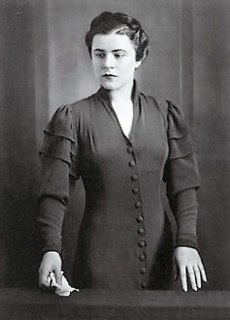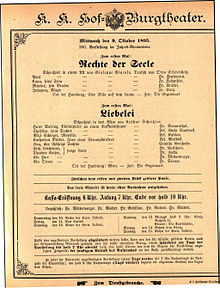
Arthur Schnitzler was an Austrian author and dramatist.

Maximillian Oppenheimer, known as Max Ophüls, was a German-French film director who worked in Germany (1931–1933), France, and the United States (1947–1950). He made nearly 30 films, the latter ones being especially notable: La Ronde (1950), Le Plaisir (1952), The Earrings of Madame de… (1953) and Lola Montès (1955). He was credited as Max Opuls on several of his American films, including The Reckless Moment, Caught, Letter from an Unknown Woman, and The Exile. The annual Filmfestival Max Ophüls Preis in Saarbrücken is named after him.

Paula Anna Maria Wessely was an Austrian theatre and film actress. Die Wessely, as she was affectionately called by her admirers and fans, was Austria's foremost popular postwar actress.

Attila Hörbiger was an Austrian stage and movie actor.

The Burgtheater, originally known as K.K. Theater an der Burg, then until 1918 as the K.K. Hofburgtheater, is the national theater of Austria in Vienna. It is the most important German-language theater and one of the most important theatres in the world. The Burgtheater was opened in 1741 and has become known as "die Burg" by the Viennese population; its theater company has created a traditional style and speech typical of Burgtheater performances.

Adele Sandrock was a German-Dutch actress. After a successful theatrical career, she became one of the first German movie stars.

Birgit Minichmayr is an Austrian actress born in Linz, Austria. She studied drama at the Max Reinhardt Seminar in Vienna. For her work in Maren Ade's film Everyone Else she won Silver Bear for Best Actress at 59th Berlin International Film Festival. She is the only Austrian actress to win this award in history of the festival and the first Austrian actress to win best actress award at a major European film festival since 1956. She worked with several major European directors including Michael Haneke, Tom Tykwer and Jessica Hausner.

Liebelei is a 1933 German period drama film directed by Max Ophüls and starring Magda Schneider, Wolfgang Liebeneiner, and Luise Ullrich.
Dalliance is a play by Tom Stoppard, based on Arthur Schnitzler's play Liebelei. Dalliance was first performed at the Lyttelton Theatre, London, on 27 May 1986. It was directed by Peter Wood, with music by Andre Previn. It starred Stephen Moore, Brenda Blethyn, Sally Dexter and Tim Curry. Dexter won the Laurence Olivier Award for Best Newcomer in a Play for her performance.

Angela Winkler is a German actress.

Christine is a 1958 French period drama film, based on the 1894 play Liebelei (Flirtation) by Arthur Schnitzler. The film was directed by Pierre Gaspard-Huit and the title character was played by Romy Schneider. The cast included Alain Delon as a young lieutenant.

Magdalena Maria Schneider was a German actress and singer. She was the mother of the actress Romy Schneider.

Hugo August Thimig, although born in Germany, spent his working life in Austria as an actor, director, and director of the Burgtheater in Vienna.

Anatol is a play by Austrian playwright Arthur Schnitzler, published in 1893. The introduction was written by Loris, a pseudonym of the young Hugo von Hofmannsthal, who was a friend of Schnitzler. It is a seven-act play set in late 19th century Vienna, depicting the many shallow and immature relationships of bourgeois playboy Anatol. The first act, Die Frage an das Schicksal, earned Schnitzler the title of Psychologischer Tiefenforscher from Sigmund Freud.
A Love Story is a 1933 French historical drama film directed by Max Ophüls and starring Abel Tarride, Magda Schneider and Simone Héliard, based on Arthur Schnitzler's 1896 play Liebelei about a musician's daughter in 1890s Imperial Vienna who falls in love with a young army officer, only for him to be killed in a duel.

Clara Pollaczek was a Viennese writer of light novels, stories and verse. She also wrote several stage works. Some of her works appeared under the pseudonyms "Bob" or "Bob Béol".

Flirtation is a 1927 German silent drama film directed by Jacob Fleck and Luise Fleck and starring Fred Louis Lerch, Henry Stuart and Jaro Fürth.
Konrad Adolf Hallenstein, also Conrad Hallenstein was a German actor.

Johann Konrad Horny was a German painter, graphic artist, and copper engraver.

Young Medardus is a historical drama in a prelude and five acts by Austrian playwright Arthur Schnitzler. It premiered at the Burgtheater in Vienna on 24 November 1910, where it was directed by Hugo Thimig It tells the tale of Medardus, a flawed hero in the Shakespearean sense, who directs his final heroic deed against himself and perishes.

















